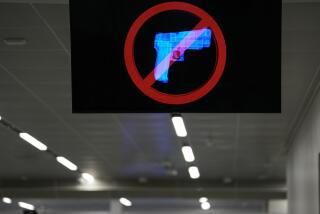One for the Rascals
- Share via
Wednesday was a red-letter day in the U.S. Supreme Court for cartoonists, satirists, parody writers, caricaturists and all those other rascals who amuse us all until one of them happens to gore our personal ox. The high court unanimously extended to them the same First Amendment protection already granted to more sober-sided members of the media--and made it clear that the protection applies even when they’re outrageous.
We confess that the press celebrations would be louder if the victors in the case were some publication other than Hustler magazine and someone other than its publisher, Larry Flynt. The parody that inspired the lawsuit, a phony advertisement depicting the Rev. Jerry Falwell engaged in what the court delicately called “a drunken incestuous rendezvous with his mother in an outhouse,” was just as tasteless as anything that appears in that magazine.
But Chief Justice William H. Rehnquist’s opinion recognized that public figures like Falwell have ample ways to defend themselves against tasteless parodies, against vitriolic criticism, even against sleaze, without suing their critics. That reasoning underlies more than two decades of First Amendment decisions by the court, all affirming that public officials and public figures must show actual malice before they can collect for defamation.
Falwell, claiming that Hustler’s parody almost made him cry, had urged the high court to exclude outrageous statements from First Amendment protection as long as they intentionally cause emotional distress, even if no one believes them. His argument has been echoed in other courtrooms as other famous people have tried to get around the broad First Amendment shield that the Supreme Court has erected in defamation cases by suing for emotional distress, a common-law tort.
But Rehnquist wasn’t buying. Outrageousness, he said, is such a slippery standard that it would allow jurors to impose liability on the basis of their own likes and dislikes. The chief justice could not bring himself to say that Hustler magazine itself added much to the robust political debate that the First Amendment is supposed to foster. But he could find no logical difference between the Hustler parody and the work of Thomas Nast and other splendid cartoonists and satirists. He acknowledged that such humor is “outrageous,” “slashing” and “one-sided,” but concluded that “our political discourse would have been considerably poorer” without it.
Anyone who doubts that people like Falwell can look out for themselves ought to keep in mind what he did with the Hustler parody. After the ad had twice appeared in Hustler, he shared his emotional distress by mailing hundreds of thousands of copies of it to his supporters to raise money for Moral Majority, which he headed at the time, and Old Time Gospel Hour. He netted $800,000 for his efforts.
As for Larry Flynt and Hustler, their victory is a vivid reminder that the real test of our commitment to the First Amendment is whether we can accept gracefully the idea that it shields even those who personally offend us.


